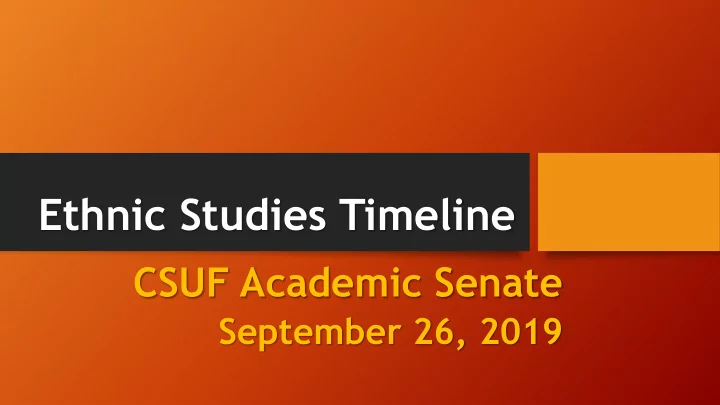

Ethnic Studies Timeline CSUF Academic Senate September 26, 2019
Why are We Here Today? 2 • We value your input about how a CSU ethnic studies requirement might be designed and implemented. • As a result, we the faculty and Senate of CSUF must focus on the future in the next month.
Curricular Purview within the CSU 3 • Faculty have purview over the curriculum. The primary means for maintaining this purview, especially as it relates to CSU systemwide curriculum requirements, is through the Academic Senate of the CSU (ASCSU).
Curricular Purview within the CSU 4 • On 9/20/19 the ASCSU passed a resolution that they shall “explore with the [CSU] campuses an ethnic studies requirement [ESR] that each CSU baccalaureate graduate shall meet, with parameters determined by the ASCSU after seeking guidance from the CSU Council on Ethnic Studies and the 23 CSU campus senates. Such guidance … [shall] be received by November 1, 2019.”
The Timeline for CSUF’s Input on the ESR 5 • OCTOBER 7 TH TO OCTOBER 14 TH : DISTRIBUTE ESR SURVEY TO ALL FACULTY. • OCTOBER 21 ST : MAKE RESULTS OF SURVEY AVAILABLE TO ALL ON CAMPUS. • OCTOBER 31 TH : SPECIAL SENATE MEETING TO DECIDE UPON CAMPUS RESPONSE TO ASCSU’S REQUEST. • NOVEMBER 1, 2019: FEEDBACK DEADLINE. CSUF has about a month to provide our RESPONSES to the questions raised by the ASCSU.
Next Steps - Today 6 1. Senator Stambough presents and briefly explains the 12 questions (5 prompts) from the ASCSU concerning ESR. 2. 11:50 a.m. We break up into groups for 20 minutes to discuss possible answers to the questions. Please sit with someone you do not know, from different departments/constituencies. 3. 12:10 p.m. We reconvene as a group, and Senator Matz elicits responses from groups about the 12 questions. 4. 12:30 p.m. Q&A time with a speaker’s list led by Chair Stohs .
Group Discussion of Resolution and Prompts 7 • Resolved : That the Academic Senate of the California State University explore with the campuses an ethnic studies requirement that each CSU baccalaureate graduate shall meet, with parameters determined by the ASCSU after seeking guidance from the CSU Council on Ethnic Studies and the 23 CSU campus senates.
First prompt — Learning Outcomes 8 • Considering the CSU Task Force on the Advancement of Ethnic Studies Report and campus context, ”What learning outcomes specific to ethnic studies as derived from current best practices and definitions of ethnic studies are to be included?” • Questions: • How broad or narrow should the learning outcomes be? • Should the descriptions be limited to the four historically defined core groups (Native Americans, African Americans, Asian Americans, and Latina and Latino Americans)? • Include other groups? • Can this requirement be taught in different academic units?
Second Prompt — Type of Requirement 9 • Consideration of the tradeoff in having the ethnic studies requirement as a stand-alone graduation requirement versus as a required GE overlay (e.g. separately, within the major, or upper-or lower-division GE or parts of both?). • Questions: • Should the requirement be the same across the system or should campuses be given flexibility in how to implement the requirement? • Should the ethnic studies requirement be offered as an upper-division requirement and designed to build from lower division requirements? • Is it possible for the requirement to be fulfilled as parts of a variety of courses instead of within a single course?
Third Prompt--Implementation 10 • Should implementation allow for campus-specific additions to the requirement (consistent with the spirit of requirement)? • Questions: • Should the ethnic studies requirement be structured as “Do A, B, C, and D, and if you add an E, F , and G, that is fine”? • What are our preferences concerning ethnic studies vs a broader definition of diversity or cultural competency?
Fourth prompt — Integrity of Requirement 11 • What best practices should be encouraged for campuses to adopt in their course evaluation and approval processes for meeting the learning outcomes specific to ethnic studies in order to maximize consistency and integrity of the requirement? • Questions: • How can disciplinary deference and commitment to the core principles be protected against courses that may meet the letter of the objectives but not the spirit of the objectives? • How to protect against a requirement becoming ’less than the sum of its parts’?
Fifth Prompt — Time 12 • What would be the earliest feasible and appropriate date for implementation? • Question: • Given scheduling and catalog changes, what is possible and advisable?
Recommend
More recommend